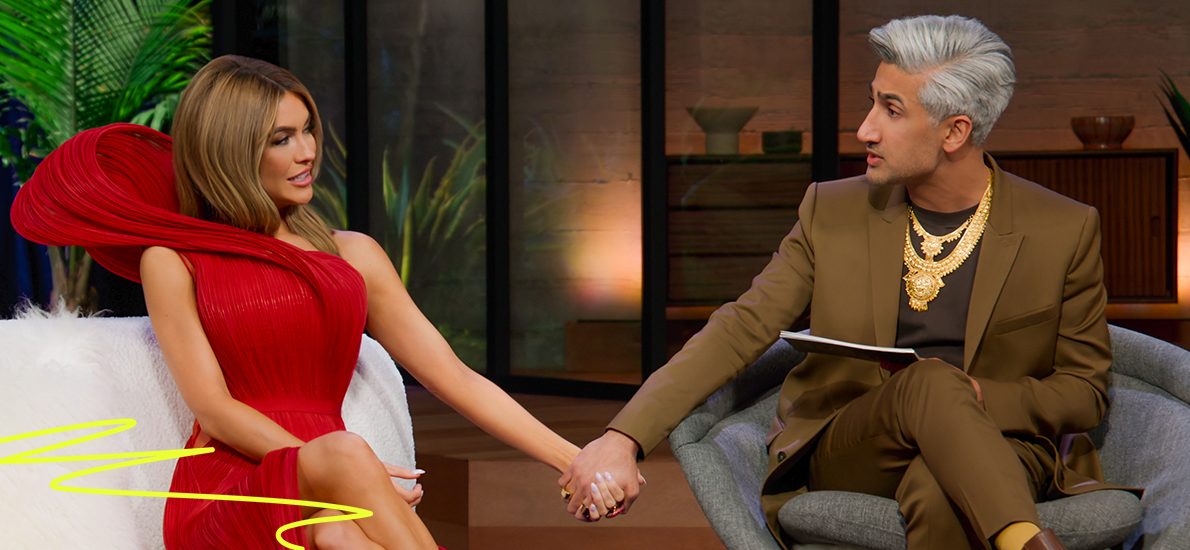Selling Sunset has grown into a dynamite franchise. Quickly dominating Netflix airwaves and premiering at number one amidst season five’s April 22nd release, the series has gained popularity over the course of three years. According to Parrot Analytics, the show, which follows a firm of luxury real estate agents as they finesse the Hollywood housing market with style and sass, ranks at the 88.2% percentile in the reality genre.
At the heart of the drama this season was the power couple incessantly force fed to audiences, Chrishell and Jason. Their dilemma boiled down to children—Chrishell’s desire for and Jason’s against—and whether one would concede for the other. The two ultimately end up splitting, and at the reunion, we see how their breakup has impacted them. Jason cries, Chrishell cries, and we hear news that Chrishell has moved on with someone drastically different than previous partners: 27-year-old nonbinary rockstar G Flip.
Being in a queer relationship comes with a lot of scrutiny at the hands of friends, family, and society as a whole. My girlfriend and I have been followed, catcalled, and sexualized in public settings more often than I can remember. Historically, queer relationships have been seen as promiscuous, temporary, or dirty, an image perpetuated through media, news, and everyday language. Because of this, queer people are typically prone to being unfairly criticized, demeaned, and scrutinized based on negative stereotypes deeply engrained in society.
News of Chrishell’s relationship broke during the Selling Sunset reunion that aired on May 6th, and immediately, people were on edge. Host Tan France, one of several Queer Eye cast members, moderated the reunion and handled Chrishell coming out aggressively, continuing to question her despite Chrishell’s clear discomfort. After asking Chrishell if there was anything new to tell us, hinting at the rumors in tabloids about her relationship with G Flip, France pushes for answers following Chrishell’s elusiveness on dating. “Who are you enjoying?” he asks. She fiddles with her hair nervously, touches her face, and avoids eye contact before being forthcoming about her relationship with the musician.
The entire mood shifts following Chrishell’s reveal. The cast looks around at each other as if to confirm this is, in fact, who Chrishell is dating, with Maya’s reaction quickly becoming the most memeable response. Immediately, the cast’s behavior shifts as the camera sweeps over their faces to catch the disbelief. Try as some may to argue these reactions as “genuine astonishment,” the entire thing felt like a “gotcha” moment set up by producers to put Chrishell on the spot. Mary stammers over her words, Maya’s jaw drops, and Davina looks wide-eyed at photos of G Flip and Chrishell. Subconsciously, their responses, through stuttering, blank stares, and overall confusion, sends the message that Chrishell’s news is shocking, and something to be looked at outside of the ordinary. Their behavior becomes distant and cold—they’re avoiding eye contact, looking panicked, and making faces, a clear exhibition of detailed microaggressions queer individuals face every day.
“A key feature of microaggressions, and particularly microinvalidations, is that they are frequently non-deliberate and unconscious on the part of the actor,” details report Validation of the Sexual Orientation Microaggression Inventory In Two Diverse Samples of LGBTQ Youth. “These subtle forms of discrimination can seriously impact the mental and physical well being of the individuals who experience the discrimination or invalidation resulting in psychopathology, emotional distress, and poor physical health.”
As if the looks shared between cast members weren’t enough, France quickly follows up with no time for discussion as they move into a clip from G Flip’s new music video “GET ME OUTTA HERE”, featuring Chrishell. There’s heavy making out between G Flip and Chrishell in the video, something her co-workers watch in real time before her, and after, France proceeds to shame, fetishize, and disregard queer relationships through very coded questioning. He engages the other cast members and their history with same sex relationships asking if they’ve ever tried “dabbling,” indicating queerness is something to try on.
Mary refuses to answer the question, saying her “parents are going to see this,” and France asks the others if they’ve ever been “dirty birds” or “naught” in regards to doing anything with other women. Emma shrugs and says she has and in response, France gets up to high five her, fetishizing queer relationships as some passing party trick for straight women to engage in. In doing so, France highlights historical assumptions that queer relationships are sultry, sexy, and some “dirty little secret.”
Considering the constant harassment people in queer relationships face in real life, it’s devastating to see someone like France—who himself had a difficult time coming out—perpetuate outdated the same stereotypes that have historically impacted queer women for years.
Already, Chrishell has faced a wave of backlash she otherwise wouldn’t have if moving on with a cis-het man. Coming off a season where the ideas of a cis-het suburban lifestyle between Chrishell and Jason are largely pushed, Chrishell has been under a microscope since the wrap-up. Her Instagram comments section have blown up with homophobic comments, with fans saying they’re “highly disappointed in her” for dating G Flip, and others stating they’re “not a fan of her anymore for dating a girl now.”
Currently, her comments are shut off.
With how Selling Sunset co-stars responded to Chrishell’s news of being in a queer relationship, it’s no surprise viewers followed suit. Excusing their behavior at the reunion as anything other than homophobic sends a message that nervous side-eyes, awkward glances, and other microaggressions, such as referring to kissing same-sex partners as “dirty,” is okay. As queerphobic remarks pour in on Twitter and YouTube, public opinion reinforces, quite bluntly, an age-old misconception that queer relationships are impulsive, unrealistic, or worse, “just a phase.”
Image: Courtesy of Netflix




















































